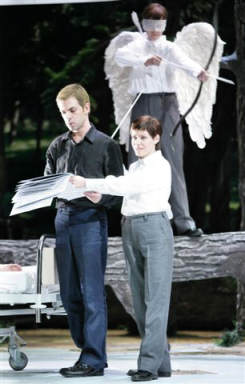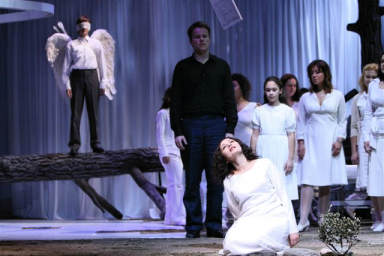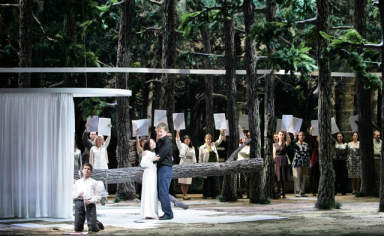Gluck: Orphée et Eurydice:
Greek
National Opera, Olympia Theater, Athens Conductor: George
Petrou 26.1.2007 (BM)

If you’d rather be boiled in oil than ever sit through
another baroque opera (countertenors, endless repetitions,
harpsichords and absolutely no action ) forget it! Here
is a production that is likely to change your mind.
At just under two hours, the length alone is conducive
to converting enemies of this genre, and the French version
has a tenor, albeit an haute-contre, singing Orphée. It’s
actually no wonder that this particular staging is so
convincing, as the director is Stephen Langridge, and
almost no one knows more about getting skeptics interested
in opera than he, who is a veteran of so many performances
including amateurs such as prison inmates and hospital
patients – the latter doubtless accounting for some of
his experience with grief management, the central theme
of this work. Thus, placing the characters in an environment
which his audience can easily relate to, his version of
Orphée et Eurydice is about the pain of the bereaved,
leading to the inexorable conclusion that if you love
someone, anguish is inevitably part of the bargain. But
the lesson Gluck teaches us through Langridge is that
it is worth it: better to love and hurt than feel nothing
at all, a lesson so simple it is often overlooked in these
frenzied times we live in.

All this was supported
intensely with apt sets and costumes by George Souglides,
a frequent collaborator of this director, focusing on
the stark contrast between a lush forest and the blinding
white of Eurydice’s death bed and hospital room (complete
with the IV-drip, already detached) and an engaging rendition
of the saying that “love is blind” by virtue of the costumes
for Amour and his doubles – including a cane and blind-folds,
respectively. The idea of doubling the three lead roles
with three dancers each (choreography: Fotis Nikolaou)
was undeniably effective, even ingenious, in bringing
out the psychological aspects at the center of this account
of the legend, in addition to adding some welcome movement
to this opera, though resulting in just a tad too much
mattress-bouncing during the first part of Act II.

Young conductor George Petrou, who has noticeable leaning
towards baroque, did an admirable job with the GNO orchestra,
and the dedicated GNO chorus under their new chorus master
Nikos Vassiliou continues to improve with each performance.
Canadian tenor Colin Ainsworth was respectable as the
bereaved Orphée, vocally on the thin side but clearly
not without potential. At times, however, when he was
singing of his pain, this seemed to be reflected in his
constricted timbre. L’Amour was Vassiliki Karayanni, whom
I have heard in better voice many a time, her slight figure
lending itself excellently to this role - but the star
of the evening was clearly Elena Kelessidi as Eurydice,
outstripping the other two protagonists by far with her
crystal-clear soprano. Here is an artist whose career
has included numerous appearances at Covent Garden, the
Met and Berliner Staatoper, but has yet to be discovered
by her compatriots - let’s hope they have now taken notice!
Furthermore, a sincere vote of confidence is due to Nikos
Dontas, head of GNO’s Dramatology Department and responsible
for the libretto booklet, including an interesting introduction
and photographs of past productions, and the first-rate
program – the first I have ever seen from GNO with extensive
translations of every one of the Greek essays for readers
not fluent in the local language. Granted, the English
could have done with a bit of editing, but admittedly
this is a minor complaint compared to the significance
of the effort made. The main thing is that a wealth of
information and references are provided, to which - begging
your indulgence – I would like to add a line from “Palace
of Desire” by Nagib Mahfouz: “To those I love from whom
I have been separated by grief”.
Bettina Mara
Pictures
© Stefanos 2006





